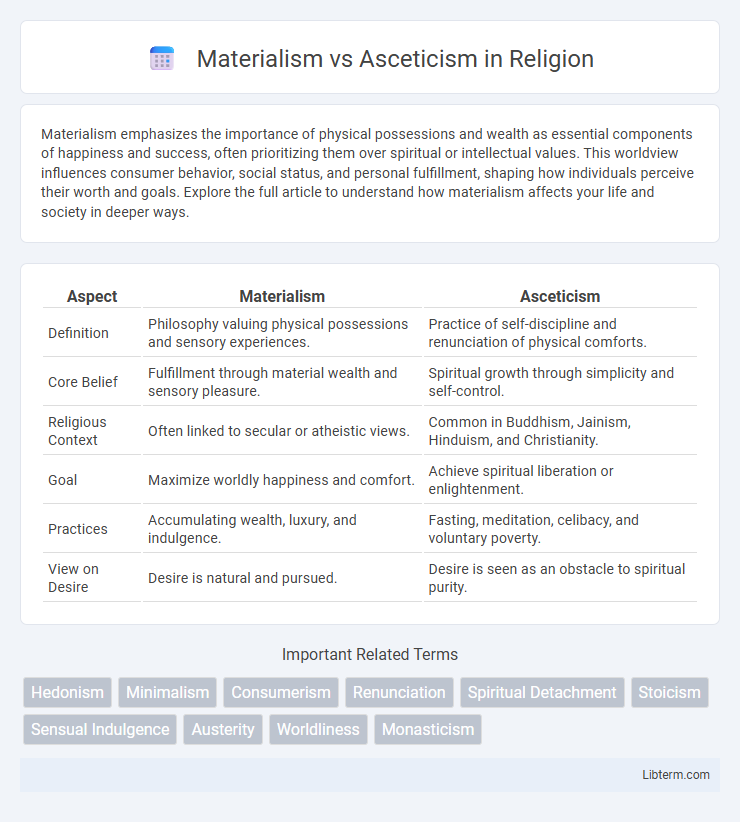Materialism emphasizes the importance of physical possessions and wealth as essential components of happiness and success, often prioritizing them over spiritual or intellectual values. This worldview influences consumer behavior, social status, and personal fulfillment, shaping how individuals perceive their worth and goals. Explore the full article to understand how materialism affects your life and society in deeper ways.
Table of Comparison
| Aspect | Materialism | Asceticism |
|---|---|---|
| Definition | Philosophy valuing physical possessions and sensory experiences. | Practice of self-discipline and renunciation of physical comforts. |
| Core Belief | Fulfillment through material wealth and sensory pleasure. | Spiritual growth through simplicity and self-control. |
| Religious Context | Often linked to secular or atheistic views. | Common in Buddhism, Jainism, Hinduism, and Christianity. |
| Goal | Maximize worldly happiness and comfort. | Achieve spiritual liberation or enlightenment. |
| Practices | Accumulating wealth, luxury, and indulgence. | Fasting, meditation, celibacy, and voluntary poverty. |
| View on Desire | Desire is natural and pursued. | Desire is seen as an obstacle to spiritual purity. |
Understanding Materialism: Core Principles
Materialism centers on the belief that physical possessions and sensory experiences constitute the primary sources of happiness and fulfillment. This philosophy emphasizes the acquisition of wealth, status, and tangible goods as essential to achieving a satisfying life. Core principles include valuing economic success, consumerism, and the accumulation of material wealth as indicators of personal and social well-being.
The Foundations of Asceticism
The foundations of asceticism emphasize self-discipline and renunciation of material possessions to achieve spiritual growth and inner peace. Rooted in philosophies such as Stoicism and Eastern traditions like Buddhism and Jainism, asceticism promotes detachment from sensory pleasures and worldly desires. This approach contrasts with materialism, which values physical wealth and external success as primary sources of fulfillment.
Historical Perspectives on Materialism and Asceticism
Historical perspectives on materialism trace back to ancient Greek atomists like Democritus, who emphasized physical matter as the fundamental reality, contrasting with Platonic and Aristotelian ideals that introduced metaphysical dimensions. Asceticism's historical roots are prominent in ancient Eastern religions such as Hinduism and Buddhism, where self-denial and spiritual discipline aimed to transcend material desires and achieve enlightenment. Throughout history, materialism often aligned with scientific inquiry and empirical observation, whereas asceticism remained tied to religious and philosophical practices focused on inner purity and detachment from worldly possessions.
Philosophical Debates: Materialism vs Asceticism
Philosophical debates between materialism and asceticism center on the nature of reality and the path to human fulfillment. Materialism asserts that physical matter and sensory experiences constitute existence, emphasizing the pursuit of tangible pleasures and wealth. In contrast, asceticism values self-discipline, renunciation of material possessions, and spiritual growth as essential for achieving true enlightenment and inner peace.
Cultural Influences Shaping Belief Systems
Materialism and asceticism are deeply shaped by cultural influences that prioritize either external possessions or internal discipline. Societies emphasizing wealth accumulation and consumerism tend to foster materialistic values, while cultures rooted in spiritual traditions like Buddhism or Stoicism often promote ascetic practices centered on self-denial and simplicity. These belief systems reflect underlying cultural narratives about success, morality, and the purpose of life.
Psychological Impacts of Materialistic Lifestyles
Materialistic lifestyles often correlate with increased levels of anxiety, depression, and lower overall life satisfaction due to the constant pursuit of external validation and possessions. Psychological research indicates that materialism can undermine intrinsic goals like personal growth and meaningful relationships, leading to feelings of emptiness and stress. In contrast, ascetic practices promote mental well-being by fostering mindfulness, self-control, and contentment through simplicity and detachment from material goods.
The Benefits and Challenges of Ascetic Living
Ascetic living promotes profound self-discipline and spiritual growth by minimizing material attachments, leading to enhanced mental clarity and emotional resilience. Challenges include enduring physical deprivation, social isolation, and the struggle to maintain motivation amidst societal pressures favoring consumerism. Embracing asceticism can foster inner peace and purposeful existence but often demands significant sacrifice and unwavering commitment.
Material Wealth vs Spiritual Fulfillment
Materialism emphasizes acquiring material wealth and sensory pleasures as sources of happiness, often correlating success with financial and physical possessions. Asceticism advocates for spiritual fulfillment through self-discipline, renunciation of material goods, and inner growth, prioritizing mental and spiritual health over external wealth. The contrast highlights the tension between external accumulation and internal enlightenment as pathways to a meaningful life.
Modern Society: Striking a Balance
Modern society grapples with the tension between materialism, which values wealth and consumerism, and asceticism, emphasizing simplicity and self-discipline. Striking a balance involves integrating mindful consumption with sustainable living practices to promote well-being and environmental responsibility. Emerging trends like minimalism and ethical consumerism reflect this synthesis, encouraging individuals to seek fulfillment beyond material possessions.
Choosing Your Path: Integrating Materialism and Asceticism
Choosing your path involves balancing materialism's pursuit of wealth and possessions with asceticism's emphasis on simplicity and self-discipline. Integrating these philosophies requires setting meaningful goals that prioritize well-being and personal growth while maintaining mindful consumption. Embracing a hybrid approach fosters sustainable living and purposeful fulfillment by valuing both external resources and internal contentment.
Materialism Infographic

 libterm.com
libterm.com